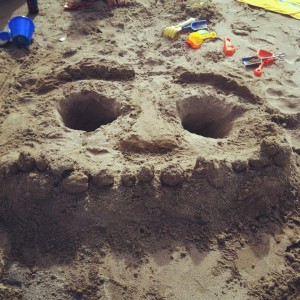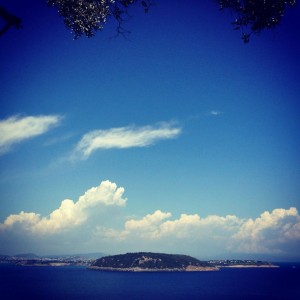It’s August, and many of us in the Department of Modern Languages and European Studies have taken a brief holiday. How do academics spend their time off? Here’s an update from Dr Daniela La Penna, Associate Professor of Italian Studies.
I am writing this quite late at night. In the next few hours, I will have to print boarding passes and take the plunge. I will go on annual leave, and in my case this year at least it means that I am heading towards my home country, Italy.
 Holidays are fraught with stress for academics. I know, it seems exaggerated and self-important but it’s true. Whoever is involved in this trade knows that every action and thought that is not directly connected to research, pastoral care, and teaching is welcomed by anxiety, anguish, and an overwhelming sense of guilt. “Oh my! I am actually enjoying this film!”, you think with a mixture of surprise and sweetness, only to be assailed by the thought of that unfinished book review or that sentence that you still have not nailed for the ending of that paragraph, and the feedback to that student… Holidays only extend the agony of self-inflicted guilt.
Holidays are fraught with stress for academics. I know, it seems exaggerated and self-important but it’s true. Whoever is involved in this trade knows that every action and thought that is not directly connected to research, pastoral care, and teaching is welcomed by anxiety, anguish, and an overwhelming sense of guilt. “Oh my! I am actually enjoying this film!”, you think with a mixture of surprise and sweetness, only to be assailed by the thought of that unfinished book review or that sentence that you still have not nailed for the ending of that paragraph, and the feedback to that student… Holidays only extend the agony of self-inflicted guilt.
How so? When I was sans child, it was not uncommon for me to spend weekends in the office, to ruminate on this and that, or finishing articles. But when I had my child, my ‘free time’ that I often and contently occupied with research and directed reading was now claimed by the sweet smile of my little daughter, who wants to discover the world with her parents. This was a paradigm shift, and I had to adapt to this structural change quickly, and I did so in a heartbeat. My holidays are her holidays and I need and want to engage with her desire to enjoy herself. However, I am a whole person, and this means that I am still a researcher obsessed with the things I do, I care deeply for my dissertation students and my postgraduates. And of course, you have 24 hours in a day, and you cannot always build sand-castles. But boundaries are a healthy and necessary thing, so if you are not naturally inclined to switch off on command, you better create fences and obstacles. Because I realised that I go ‘cold turkey’ if I don’t check emails regularly, and in order not to fall into temptation, we decided to holiday in an island near Naples that has notoriously bad reception and where wi-fi is still a thing of the future.
 Holidays means for me rehab and re-education. In a sense, I needed to be educated in the art of watching your thoughts float aimlessly, and resist the temptation of arranging them into rational systems to see them printed in written form. The art of leisure is for some an acquired taste. I don’t think this is bad (or good), it is just the way it is. My daughter has been in this case a true inspiration and a veritable teacher, and from her I learn every day. In my suitcase, I have packed a few books I would like to read, and I confess, there is one I am due to review. But only during the holidays I can actually read freely and beyond my immediate research interests.
Holidays means for me rehab and re-education. In a sense, I needed to be educated in the art of watching your thoughts float aimlessly, and resist the temptation of arranging them into rational systems to see them printed in written form. The art of leisure is for some an acquired taste. I don’t think this is bad (or good), it is just the way it is. My daughter has been in this case a true inspiration and a veritable teacher, and from her I learn every day. In my suitcase, I have packed a few books I would like to read, and I confess, there is one I am due to review. But only during the holidays I can actually read freely and beyond my immediate research interests.
I have packed my luggage and alongside a few Marcia Williams adaptations (Shakespeare and Greek Myths are high on demand!) and Oxford Reading Tree books with alluring titles such Splash and Squelch and an all-time favourite, Elephant Ears, I have managed to squeeze a few of my own. I look forward to leaf through Antal Szerb’s Journey by Moonlight, a gem of Hungarian literature recommended to me by my friend Rajneesh Narula. Will I manage to plough through the 800 pages of Eleanor Catton’s The Luminaries, a book my husband enjoyed terribly and set in his native New Zealand? It all depends on how I react to the first pages…But I confess I have my eyes set on Daniel Kahneman’s Thinking, Fast and Slow. I gave this book as a present to my friend Chris Wagstaff a couple of years ago and did not manage to finish it, and now I am going to do it. Kahneman contends that there are two types of thought: one type is fast, automatic, frequent, reactive to emotions, led by stereotypes (apparently these increase decision-making efficiency but not efficacy). The other type, and the one that underpins research, is slow. As those engaged in research know, this type of thought is effortful, alas infrequent, demandingly logical, and conscious (perhaps because you lie awake waiting for it to appear!).
This is going to be a special holiday, and one that I am determined to enjoy. For the first time it is unencumbered by the thought of a yet-unfinished book. This academic year has been very challenging and extremely busy and amongst the things I am pleased to have done is to have published my book on trilingual and diasporic poet Amelia Rosselli, an endeavour that has kept me company and given me nightmares for more than ten years. I need to recharge my batteries. Next academic year will come sooner, and it will be no doubt both challenging and hilarious, I hope in equal measure. I better build some sand-castles now, as winter is coming!

